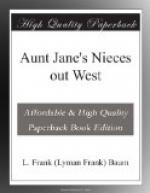CAUGHT BY THE CAMERA
“This is getting to be an amazing old world,” said a young girl, still in her “teens,” as she musingly leaned her chin on her hand.
“It has always been an amazing old world, Beth,” said another girl who was sitting on the porch railing and swinging her feet in the air.
“True, Patsy,” was the reply; “but the people are doing such peculiar things nowadays.”
“Yes, yes!” exclaimed a little man who occupied a reclining chair within hearing distance; “that is the way with you young folks—always confounding the world with its people.”
“Don’t the people make the world, Uncle John?” asked Patricia Doyle, looking at him quizzically.
“No, indeed; the world could get along very well without its people; but the people—”
“To be sure; they need the world,” laughed Patsy, her blue eyes twinkling so that they glorified her plain, freckled face.
“Nevertheless,” said Beth de Graf, soberly, “I think the people have struck a rapid pace these days and are growing bold and impudent. The law appears to allow them too much liberty. After our experience of this morning I shall not be surprised at anything that happens—especially in this cranky state of California.”
“To what experience do you allude, Beth?” asked Uncle John, sitting up straight and glancing from one to another of his two nieces. He was a genial looking, round-faced man, quite bald and inclined to be a trifle stout; yet his fifty-odd years sat lightly upon him.
“Why, we had quite an adventure this morning,” said Patsy, laughing again at the recollection, and answering her uncle because Beth hesitated to. “For my part, I think it was fun, and harmless fun, at that; but Beth was scared out of a year’s growth. I admit feeling a little creepy at the time, myself; but it was all a joke and really we ought not to mind it at all.”
“Tell me all about it, my dear!” said Mr. Merrick, earnestly, for whatever affected his beloved nieces was of prime importance to him.
“We were taking our morning stroll along the streets,” began Patsy, “when on turning a corner we came upon a crowd of people who seemed to be greatly excited. Most of them were workmen in flannel shirts, their sleeves rolled up, their hands grimy with toil. These stood before a brick building that seemed like a factory, while from its doors other crowds of workmen and some shopgirls were rushing into the street and several policemen were shaking their clubs and running here and there in a sort of panic. At first Beth and I stopped and hesitated to go on, but as the sidewalk seemed open and fairly free I pulled Beth along, thinking we might discover what the row was about. Just as we got opposite the building a big workman rushed at us and shouted: ’Go back—go back! The wall is falling.’




